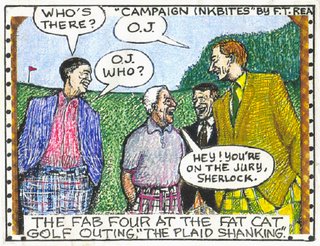 The
schism that is developing in the Virginia Republican Party this year is
nothing new. In the past similar splits have played significant roles in deciding
statewide elections. Ken Cuccinelli and E.W. Jackson are hardly the first extremists to divide the GOP along familiar ideological lines.
The
schism that is developing in the Virginia Republican Party this year is
nothing new. In the past similar splits have played significant roles in deciding
statewide elections. Ken Cuccinelli and E.W. Jackson are hardly the first extremists to divide the GOP along familiar ideological lines. In the summer of 1994, with O.J. Simpson on television 'round the clock, a four-way political race developed in Virginia. Three candidates emerged to challenge the incumbent Chuck Robb for his seat in the U.S. Senate. Republican Ollie North was nominated by a convention at the Richmond Coliseum. Which prompted Marshall Coleman, a Republican former attorney general and failed gubernatorial candidate, to run as an Independent. Former governor Doug Wilder, a Democrat, jumped into the game as an Independent.
Naturally, both Wilder and Coleman were seen as spoilers by many observers. The national press was all over the circus-like story of the four heavyweight candidates. In late August, I issued what was then my fourth set of collectible cards: “Campaign Inkbites: The ‘94 VA Senate Race.”
After swearing he was in the race 'til the finish, mercurial Wilder suddenly withdrew in October. Wooden Coleman stayed the course, with stubborn Sen. John Warner as his chief backer. North, ever the checkered-shirted dandy, raised and spent over $25 million; what was then a new record for the most ever in a U.S. Senate race ... any state.
In the end, the awkward Robb shook off his own scandals and outlasted them all.
As I produced the cards for the series, it was an interesting challenge to try to write lines for the dialogue balloons that would hold up for a month or two, no matter what the developments.
Beneath the 1994 newspaper article about that card collection are scans of 12 of the 15 original cards from the set. Without the context of this campaign's news being fresh, some of my attempts at humor may not work so well now, hopefully the caricatures are still fun to look at.
Right out of the gate, this edition was lucky with publicity: First the story below, then an AP story (with illustrations), then lots of newspapers picked that up and printed versions of it, then a five-minute report by Bob Woodruff appeared on CNN.
Sept. 6, 1994: David Poole and Dwayne Yancey (Virginian-Pilot)
Odds and ends from the past week of Virginia's U.S. Senate campaign: I'll swap you two Doug Wilders for a Tai Collins. The colorful U.S. Senate race has spawned a set of trading cards featuring the four candidates and a host of supporting characters - including the former Miss Virginia who gave a nude massage to Chuck Robb in a New York hotel.
There’s U.S. Sen. John Warner sounding defensive about his hand-picked candidate, Marshall Coleman: “Why should I strain to name an office he hasn't sought, or an abortion stance he hasn't taken? The point is: Marshall isn't Ollie.”
There’s conservative talk-show host Rush Limbaugh assessing the race: “The choice in Virginia is simple. You’ve got a stained, lap-dog liberal, a bleached and petulant liberal, a fair-weather conservative, and a genuine, world-class hero.”
There’s political pundit Larry Sabato reporting on the latest poll results: “Fifty-one percent said the race is so embarrassing they plan to leave the state.”
The “Campaign Inkbites” are the brainchild of F.T. Rea, a Richmond artist who a decade ago issued a similar deck of cards commemorating a massive death-row escape at Mecklenberg Correctional Center [by the notorious Briley brothers and four others]. The set of 15 Senate cards is available at Biff’s bookstore [also at Chickens, the snack bar in the State Capitol] in Richmond for $12 a pack.
The most unflattering likeness in the set is that of Sabato, whose green skin gives him the look of a vampire.
“Ironically, he’s my best customer,” Rea said of Sabato. “He bought 12 packs.”
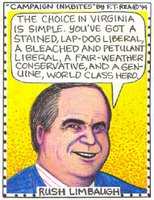
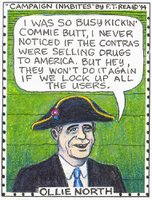
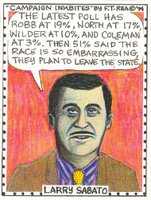
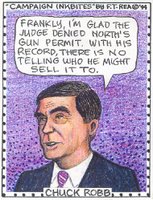
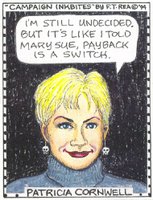
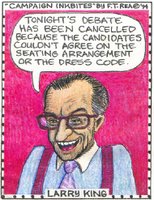
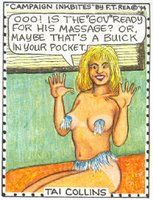
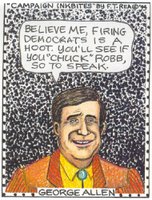
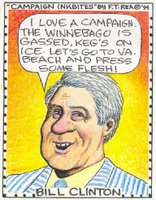
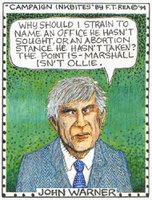
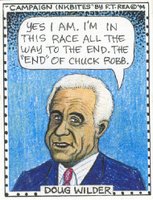 In all, about 250 sets of cards were sold in about seven weeks. Wisely, Sabato also bought the original artwork for his card.
In all, about 250 sets of cards were sold in about seven weeks. Wisely, Sabato also bought the original artwork for his card.







